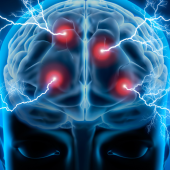The living gut ecosystem of bacteria, viruses, and other microorganisms is known as the microbiome. Studies are revealing that our microbiome plays a role in our mental health and in neurological conditions including autism, epilepsy, depression, and maybe even Parkinson's Disease. We invited three experts on gut health for a panel discussion with Dr Yasaman Tasalloti, ND, and our host E Brian Johnson to explore the associations between the gut microbiome and mental health as well as explore ways that patient outcomes can be improved.
Key Take-Aways
- Microbial Diversity Microbial diversity is an important determinant of a healthy gut, however, this level of richness also impacts mental health. When people are stressed or have mental disorders, their gut microbiota is altered. A key question is whether healthy restoration of dysbiosis can improve mental health.
- Stress and the Microbiome Stress affects the gut microbiome in the same way as assault by bacteria or viruses. Inflammatory cytokine metabolism becomes dysregulated, which results in immune system dysfunction with downstream health impacts.
- Assessing Dysbiosis Diagnostic functional tests are available to identify the balance between “good” and “bad” bacteria. These tests use fecal sampling and can show improvements in dysbiosis effected using probiotics and prebiotics. Comprehensive digestive stool analysis is a great example of such a test, although general questions about stool color, hydration, consistency and regularity can also be useful in assessment of gut dysbiosis.
- Role of Diet Diet exerts a pivotal role in improving gut microbial health. Ensuring a variety of macronutrients, as well as a good representation of plant-based foods, is important in maintaining a healthy gut flora. A vast difference exists between the microbiota within people who eat a diet that's loaded in processed foods versus those with balanced diets. When people eat fruits and vegetables, or even a Mediterranean based diet, it will favorably impact their microbiome.
- Importance of Probiotics Taking probiotics can enhance microbiome richness at a community-based level, replacing pathogenic gut bacteria with beneficial ones. Although even broad-spectrum probiotic use can assist with resolution of gut dysbiosis, an evolving literature base shows that different strains of what are termed psychobiotics, or strains of probiotics that are known to have a role in affecting mental health, can be used optimally when helping patients who may be dealing with mental health disorders or psychiatric illness.
Key Quotes
“When we have “gut instincts” that absolutely activates different aspects of our whole biology. I really do believe that as more information is discovered, we're going to see a real influence on the gut and the vagal system and the brain because the vagus nerve is so integral.”
Dr J Prousky ND
“You know the obese and people with comorbidities, tend to have some kind of dysbiosis. Now is that just coincidence? Maybe, but it is something that I think needs to be addressed.”
Dr D Lescheid PhD
“So that stress component that takes place is still going to have an effect on the gut, it's going to have an effect on the different microbes, and it's going to have an effect on inducing inflammation in the gut.”
Dr B Weiss ND
==
The opinions expressed in this Nutramedica program are those of the guests and contributors. They do not necessarily reflect the opinions of Nutritional Fundamentals For Health Inc.
This video is intended for licensed or registered health professionals and students of health professions only. These statements have not been evaluated by the Food and Drug Administration. Information contained in these programs is not intended to diagnose, treat, cure or prevent any disease.



